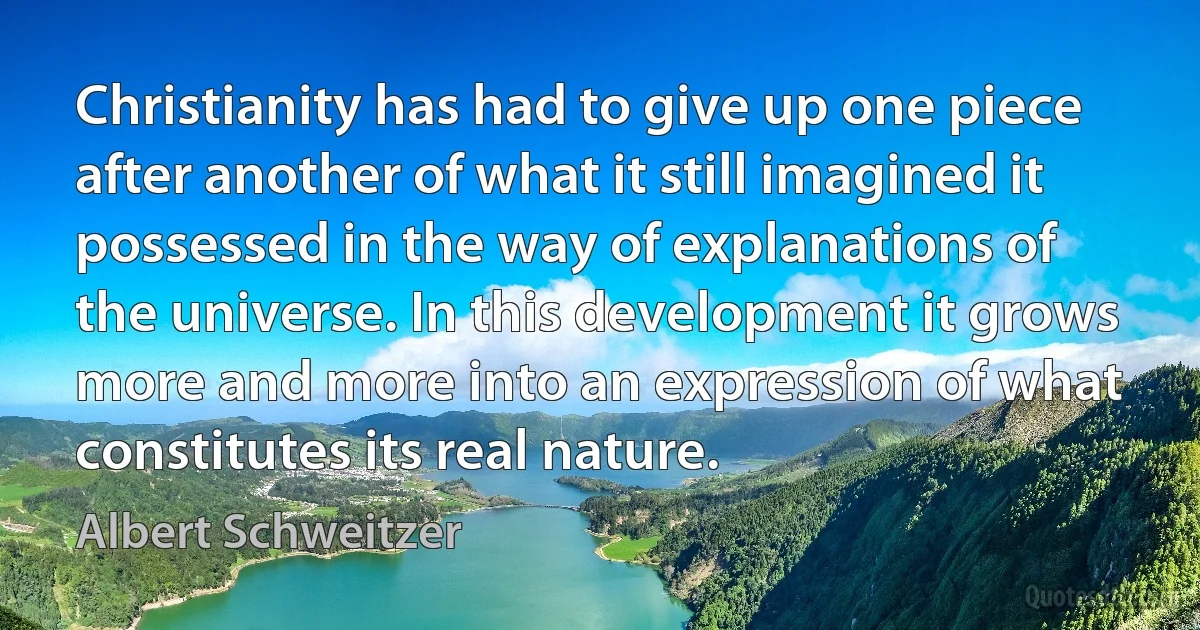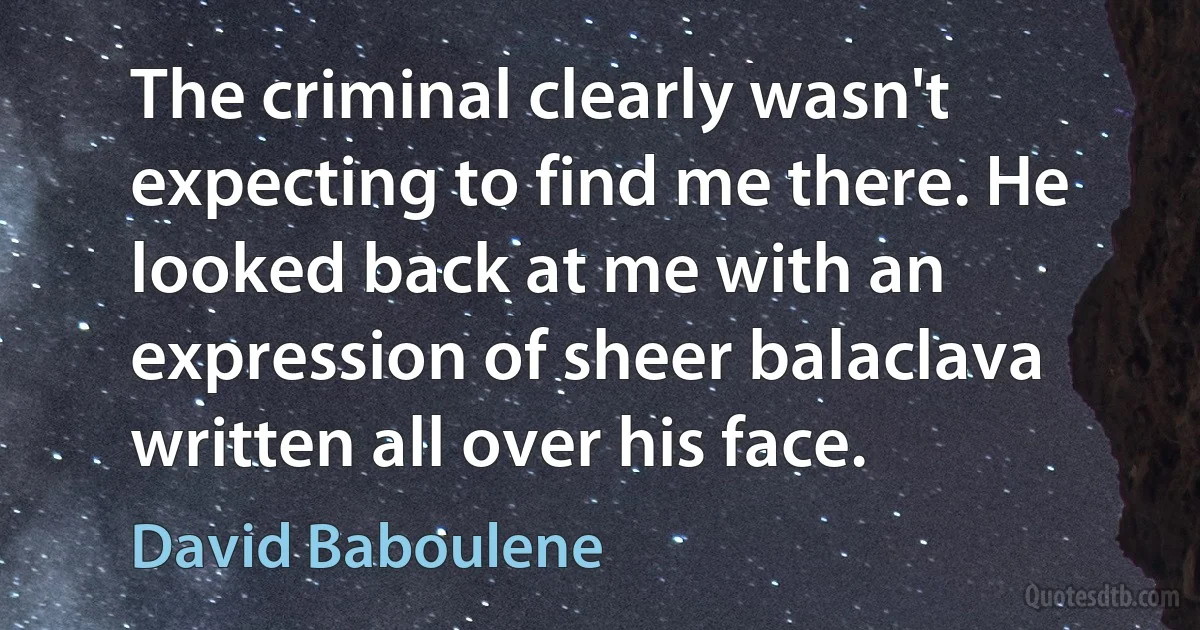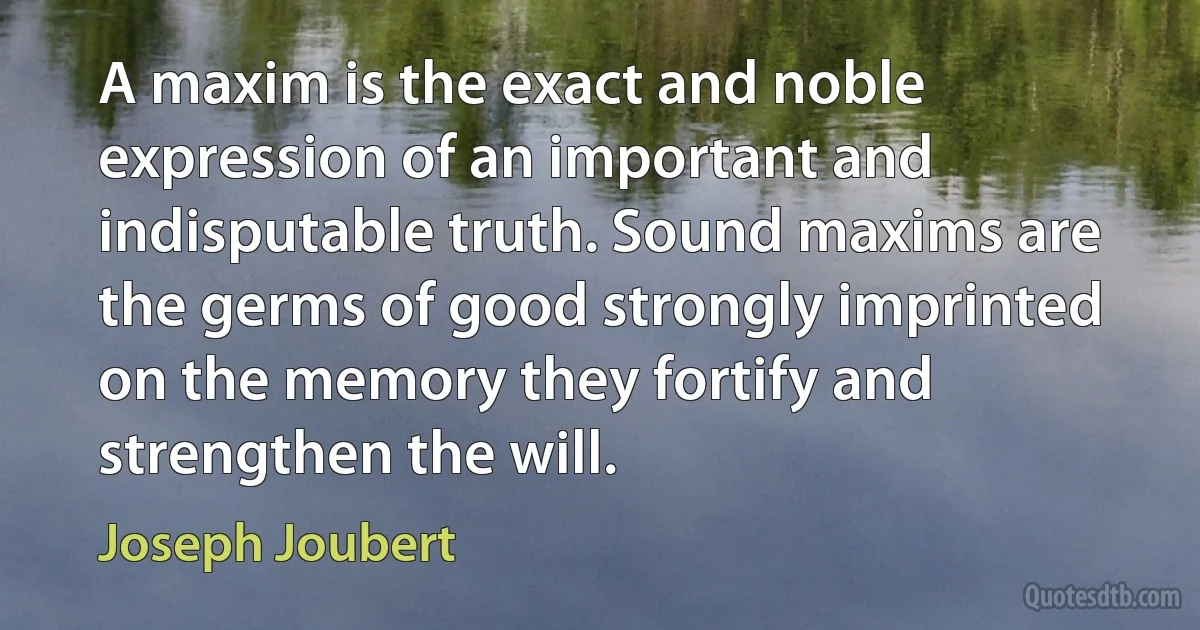Expression Quotes - page 70
The peculiar evil of silencing the expression of an opinion is, that it is robbing the human race posterity as well as the existing generation those who dissent from the opinion, still more than those who hold it. If the opinion is right, they are deprived of the opportunity of exchanging error for truth if wrong, they lose, what is almost as great a benefit, the clearer perception and livelier impression of truth, produced by its collision with error.

John Stuart Mill
The average person is in the habit of saying, "The older I get" and he thereby calls the attention of his mind to the idea that he is getting older. In brief, he compels his mind to believe that he is getting older and older, and thereby directs the mind to produce more and more age. The true expression in this connection is, "The longer I live." This expression calls the mind's attention to the length of life, which will, in turn, tend to increase the power of that process in you that can prolong life. When people reach the age of sixty or seventy, they usually speak of "the rest of my days," thus implying the idea that there are only a few more days remaining. The mind is thereby directed to finish life in a short period of time, and accordingly, all the forces of the mind will proceed to work for the speedy termination of personal existence. The correct expression is "from now on," as, that leads thought into the future indefinitely without impressing the mind with any end whatever.

Christian D. Larson
Thoreau's famous retreat to Walden Pond is thus in a continuum with his sense of the duty of disobedience. He argued that "under a government which imprisons any unjustly, the true place for a just man is also a prison." Less self-destructively; we might say that Thoreau concluded that you might find a just man outside, at Walden Pond, in a self-created exile that is also the expression of a desire for the next world. He understood this exile as the need to create a society- even if a society of one on the banks of a tiny Massachusetts pond- that he could willingly join.

Curtis White
We are creating a world where anyone, anywhere may express his or her beliefs, no matter how singular, without fear of being coerced into silence or conformity.
Your legal concepts of property, expression, identity, movement, and context do not apply to us. They are all based on matter, and there is no matter here.

John Perry Barlow
The idea of a law of progress, or of an all but irresistible tendency to general improvement, is then merely a superstition, one of the tents of the modernist pseudo-religion of humanism. Even if such a law or tendency existed and were demonstrable, the liberal faith in progress would for Santayana be pernicious. For it leads to a corrupt habit of mind in which things are valued, not for their present excellence or perfection, but instrumentally, as leading to something better; and it insinuates into thought and feeling a sort of historical theodicy, in which past evil is justified as a means to present or future good. The idea of progress embodies a kind of time-worship (to adopt an expression used by Wyndham Lewis) in which the particularities of our world are seen and valued, not in themselves, but for what they might perhaps become, thereby leaving us destitute of the sense of the present and, at the same time, of the perspective of eternity.

John N. Gray
Fate suggests submission to the circumstances of life; destiny suggests active engagement. The former implies some all-powerful force or figure to whose will we must submit. The latter implies that each of us is a manifestation of one of the infinite aspects of creation, whose fullest expression depends in some small but necessary way on our day-to-day, moment-to-moment decisions.

Fenton Johnson
My "Poems" were written without a purpose, other than the expression of faiths and ideals strongly realized and emotions keenly felt. They were written for the joy of writing, and for the satisfaction of an irresistible impulse. It is my belief that it is not the business of art either to teach or to preach.

Florence Earle Coates
America must be voluntarily chosen by its new citizens, or it will not represent their aspirations or satisfy their needs. The greater the freedom given for creative impulse and variation in expression, the richer will be the resultant American life. And in the future American ideals will have to be both more exalted and more practical than in the past, and its life will have to square more generally with them, because the lands from which these peoples come will be free from the yoke of oppression. Democracy being free for the world, they may then realize in many lands the dreams which to them once made America the only land where such dreams could come true.

Frances Kellor
Amazon society, as mythology, history, and universal male nightmare, represents a culture in which women reign culturally supreme because of their gender. Amazon societies are also important because women were trained to be warriors-military and, presumably, in other ways as well. ...
In Amazon societies, women were mothers and their society's only warriors; mothers and their society's only hunters; mothers and their society's only political and religious leaders. No division of labor based on sex seems to have existed in such societies. Although Amazon leaders existed and queens were elected, the societies seem to have been ... ones in which any woman could aspire to and achieve full human expression.
In Amazon society, only men, when they were allowed to remain, were, in widely differing degrees, powerless and oppressed.

Phyllis Chesler
...Yuri Khanin, a young composer, this year a graduate of the Leningrad Conservatory managed to do everything about the orchestration, arrangement and choice of instruments in a very precise way. It was done with an ideal exactitude. Never before had I worked with composers so much, and I was really struck by his understanding. I think that sound, no less than the image, should produce not only emotional impact, but is to have an altogether independent semantic meaning. The spirituality of the film as if finds its expression through the sound. And spirituality would not emerge by itself. If you might sometimes fail to keep alive the memory of a visual image in your mind and in your heart the soul would never forget sounds...

Alexander Sokurov
If one feels the need of something grand, something infinite, something that makes one feel aware of God, one need not go far to find it. I think that I see something deeper, more infinite, more eternal than the ocean in the expression of the eyes of a little baby when it wakes in the morning and coos or laughs because it sees the sun shining on its cradle.

Vincent van Gogh
The purpose of art is expression. Of course this short sentence raises many questions. By itself it is uninformative. One should specify what art can and cannot express. One should specify what art should and should not express. These questions cannot be answered without having some notion of the nature of man. Here it is presupposed that God created man as essentially a rational being. This implies that man's most valuable expressions are rational and intellectual. Therefore, although man can express emotion, by screaming "Ouch,” art becomes more human and valuable in proportion to its intellectual content. This does not deny that excellent technique may express triviality, evil, and insanity. It asserts, however, that what should be expressed is rational and intelligent.

Gordon Clark



